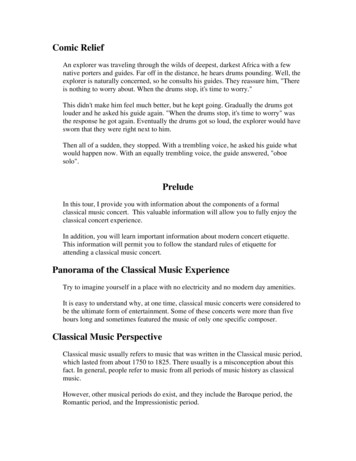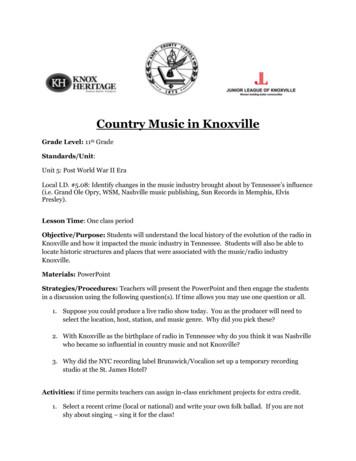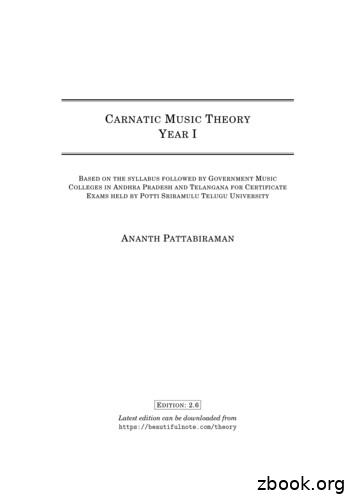Music-Free documents Library
Classical Music Perspective Classical music usually refers to music that was written in the Classical music period, which lasted from about 1750 to 1825. There usually is a misconception about this fact. In general, people refer to music from all periods of music history as classical music. However, other musical periods do exist, and they .
Country Music is a blend of popular music originally found in the Southern United States and the Appalachian Mountains. It has roots in traditional folk music, Celtic music, gospel music and old-time music and it evolved rapidly in the 1920’s. Early history Immigrants to the Southern Appalachian Mountains of North America brought the music and
geetham, i.e., the union of music and words (swaram and sahityam). Geethams are the simplest of melodies. The term geetham literally means a song, but in Carnatic music it signifies a particular type of composition. The music of the geetham is simple melodic extension of the raga in which it is composed. Its tempo is uniform.File Size: 433KBPage Count: 18Explore furtherCertificate Theory Syllabus – Carnatic Music Examscarnaticmusicexams.inCarnatic Music Theory Notes - Carnatic Academycarnaticacademy.weebly.comSouth Indian Classical (Carnatic) Music Basics (Sarali .www.shivkumar.orgCARNATIC MUSIC (VOCAL) THEORY (Code No. 031) Syllabus for .cdn.aglasem.comkarnATik Beginners' Lessons Notationwww.karnatik.comRecommended to you b
Music is an important part of school life 1. Students enjoy making music and many continue to play music throughout their lives after a good music education in school 2. Music programs can bring the school community together, raise the school’s profile in the community, and boost morale Music education can have benefits to other areas of learning
A 9 Another day in Paradise Popular Music B cont. *1 A joyous greeting 359 Alfie Popular Music 33 Bohemian Rhapsody Popular Music 1 A nightingale sang Popular Music 370 All by myself Popular Music 34 Boom bang a bang Popular Music 2 Abba selection Selection 371 All about that bass (Tuba) Popular Music 34 Born free Film Music 2 Abba Gold Selection B * Boy
MUS 1610 Music Theory And Ear Training I 2 4 MUS 1620 Music Theory And Ear Training II 2 4 MUS 2610 Music Theory And Ear Training III 2 4 MUS 2620 Music Theory And Ear Training IV 2 4 MUS 3610 Form And Analysis 3 MUS 4620 Counterpoint: Introduction 3 Music History and Literature 2 MUS 2410 Music History And Literature I: World Music And Jazz 3
Western Music in Context: A Norton History Walter Frisch series editor Music in the Medieval West, by Margot Fassler Music in the Renaissance, by Richard Freedman Music in the Baroque, by Wendy Heller Music in the Eighteenth Century, by John Rice Music in the Nineteenth Century, by Walter Frisch Music in the Twentieth and Twenty-First Centuries, by Joseph Auner
Within the framework of music production, specialised professional targets receive particular focus in addition to composition and production techniques of the various fields of applied media music: film music, theatre music, advertising music, audio branding and sound design, as well as music for computer games.
Berklee Online's seven other majors. Music Majors Music majors at Tri-C can transfer to Berklee Online and choose from eight majors including Music Production, Guitar, Music Business, Songwriting, Interdisciplinary Music Studies, Songwriting and Producing Music, Electronic Music Production and Sound Design, and Music Composition for Film, TV, and
Music Performance (A.A.) to Interdisciplinary Music Studies: Music Performance Berklee Online Transfer Credit Guide Semester 1 Course Code Course Name Credit Hours Berklee Online Requirement MUS-101 Piano 1 1 Piano Elective 1.1 MUS-141 Applied Music I 2 Any Level Music Elective MUS-142 Applied Music II 2 Any Level Music Elective
class should focus on music, "musicing" 7 and musicianship. That does not mean that literacy should be ignored. Rather, music literacy should be pursued. Music class instruction in literacy should focus on music awareness, music performance, music appreciation, and the decoding of music as a form of communication. 8 When this is
UNIT 1: JEWISH MUSIC 101 10 CONCEPTUAL FRAME FOR 'DEFINING' MUSIC CONTEXT: Music by Jews or music in Jewish social/religious contexts. For example: Music by (Jewish composers) such as Debbie Friedman or Craig Taubman, whether or not based directly on a Jewish text, sung in Jewish camps and synagogues is/ becomes Jewish music.
Hidden gems
- Tous Les Sites De Paris Sportifs Belgique
- Site De Paris Sportif Belgique
- Meilleur Casino Belgique En Ligne
- Site Paris Sportif Belgique
- Casino App
- Specialiste Tennis Paris Sportif
- Plinko Game Avis
- ライブ カジノ
- オンラインカジノ 本人確認不要
- オンラインカジノ 出金早い
- KYC 미인증 카지노
- 稼げるカジノ アプリ
- 비트코인 스포츠베팅
- Nhà Cái Châu âu
- Scommesse Crypto
- Scommesse In Crypto
- Nouveau Casino En Ligne Avec Bonus Sans Dépôt
- Avis Cresus Casino
- Bonus Casino En Ligne
- Casino Sans Depot
- Bonus Sans Dépôt Nouveau Casino
- 연령 인증 없는 카지노사이트
- Siti Non Aams
- Meilleur Casino En Ligne Français
- Siti Non Aams Sicuri
- Migliori Casino Non Aams
- Siti Scommesse Stranieri Legali
- Meilleur Casino Live Francais
- Trang Cá độ Bóng đá
- 안전한 코인카지노
- Meilleur Casino En Ligne France
- Casino En Ligne
- Meilleurs Casino En Ligne
- Site De Casino En Ligne
- Casino En Ligne
- Casino En Ligne Fiable
- Nouveau Casino En Ligne 2026
- Nouveaux Casinos En Ligne
- Crypto Trusted Online Casino Malaysia 2026
- Top Malaysia Online Casino Sites


